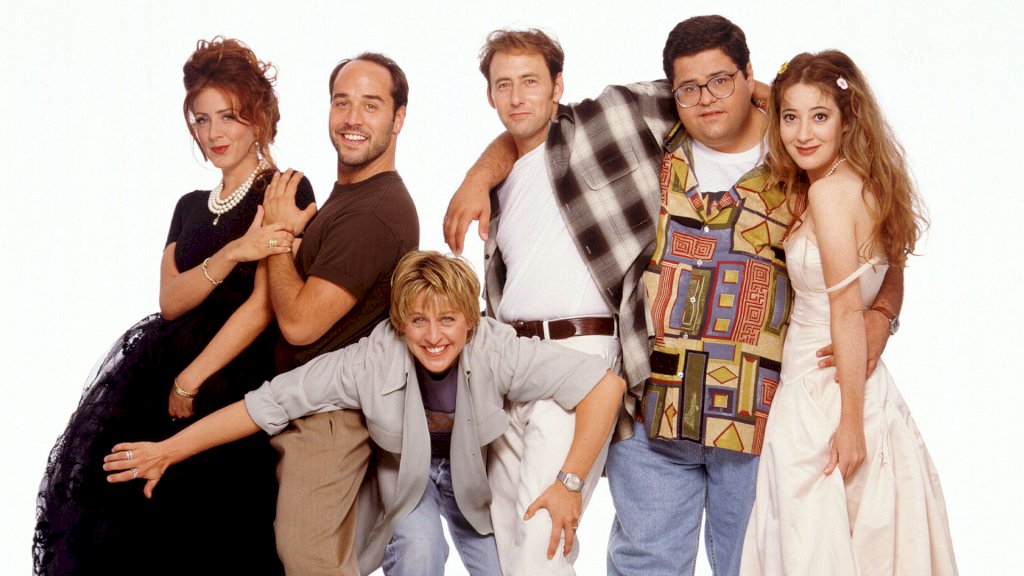In the mid-1990s, a groundbreaking television series emerged that would go on to make history in the realm of entertainment. "Ellen," starring comedian and actress Ellen DeGeneres, ran from 1994 to 1998 and was more than just a sitcom; it was a cultural milestone. With its witty humor, relatable characters, and an unforgettable coming-out episode, the show changed the television landscape and helped pave the way for LGBTQ+ representation in mainstream media.
The Rise of Ellen DeGeneres

Ellen DeGeneres's journey to fame began long before her eponymous sitcom. Born on January 26, 1958, in Metairie, Louisiana, Ellen initially pursued a career in stand-up comedy. Her unique blend of observational humor and relatable anecdotes quickly won over audiences across the country.
Ellen's stand-up career took off in the 1980s when she appeared on "The Tonight Show Starring Johnny Carson." Her charisma and wit made her a favorite guest on various talk shows and comedy specials.

By the early 1990s, Ellen had transitioned to television, appearing in sitcoms like "Open House" and "Laurie Hill." While she gained some recognition, it was her appearance on "The Larry Sanders Show" in 1994 that caught the attention of producers and led to her own show.
"Ellen" - The Groundbreaking Sitcom

In 1994, Ellen DeGeneres embarked on a groundbreaking journey when she starred in her self-titled sitcom, "Ellen." The show was a breath of fresh air in the television landscape and marked a pivotal moment in the portrayal of LGBTQ+ characters on television.
Ellen played the character of Ellen Morgan, a neurotic and lovable bookstore owner. While the character was relatable to many viewers, it was her journey of self-discovery as a gay woman that set the show apart.

The pinnacle of "Ellen" was undoubtedly "The Puppy Episode," which aired in April 1997. In this episode, Ellen's character came out as gay, making her the first lead character on a prime-time sitcom to do so. The episode garnered widespread attention and acclaim.
Ellen's coming out was a watershed moment for LGBTQ+ representation in media. It helped pave the way for more inclusive storytelling in television and led to increased visibility for LGBTQ+ individuals in the entertainment industry.
The Cultural Impact of "Ellen"

"Ellen" was not just a sitcom; it was a cultural phenomenon that left an indelible mark on American television and society as a whole.
The show challenged stereotypes about LGBTQ+ individuals by portraying Ellen as a relatable, funny, and kind-hearted character. This portrayal helped humanize gay characters and contributed to changing societal perceptions.

"Ellen" was not afraid to tackle important social issues. In addition to LGBTQ+ representation, the show addressed topics such as discrimination, acceptance, and the challenges faced by the LGBTQ+ community.
The show's impact was recognized by the industry, earning Ellen numerous awards, including multiple Emmy Awards. It also paved the way for other LGBTQ+ creators and performers in the television industry.
The Challenges Faced by Ellen DeGeneres

While "Ellen" was celebrated for its groundbreaking achievements, Ellen DeGeneres faced significant challenges, both professionally and personally, during this period.
Ellen's decision to come out on the show was met with backlash from some conservative groups and critics. Advertisers pulled their support, and the show's ratings suffered in the aftermath of "The Puppy Episode."

The backlash took a personal toll on Ellen, leading to struggles with depression and anxiety. She later revealed that she faced difficulties finding work in Hollywood after the show's cancellation.
Despite the challenges, Ellen DeGeneres's courage in coming out and her commitment to LGBTQ+ representation paved the way for future LGBTQ+ entertainers and creators.
The Legacy of Ellen DeGeneres

The impact of Ellen DeGeneres and her sitcom "Ellen" extends far beyond the years it was on the air.
Ellen's bravery in coming out and her advocacy for LGBTQ+ rights have left a lasting legacy. She continues to be an important figure in the fight for equality.

Following the end of "Ellen," Ellen DeGeneres reinvented herself with her daytime talk show, "The Ellen DeGeneres Show," which premiered in 2003 and ran until 2022. The show became a cultural staple and featured celebrity interviews, humor, and philanthropy.
Ellen used her platform to make a positive impact on society through various charitable endeavors, such as supporting environmental causes, disaster relief efforts, and advocating for kindness.
Conclusion
Ellen DeGeneres's journey from 1994 to 1998 was a remarkable period in the history of American television. Her sitcom "Ellen" broke down barriers and initiated important conversations about LGBTQ+ representation and acceptance. Despite the challenges she faced, Ellen's impact on the entertainment industry and her advocacy for social change continue to resonate with audiences today. Her legacy as a trailblazing entertainer and advocate for equality is undeniable, and she will always be remembered as a comedy pioneer who made a difference in the world.


-1691744324.jpg)

